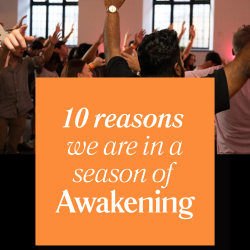
There is much excitement about the current openness of students and young adults to Jesus and the church - and rightly so. But there is an important question to ask ourselves in the midst of all the celebration: how did we get here? This new openness isn’t something that we just woke up to one day - although it may feel like that. And so we need to ask ourselves: what are the factors that have caused this monumental shift in culture? And what do we need to learn from this to make the most of these opportunities?
Let’s be really clear: this moment isn’t because of anything we have masterminded. It isn’t man-made. The Spirit of God is on the move. He is doing what only he can do: waking people up, stirring a longing deep in their souls; speaking to them in dreams and visions; prompting them in ways they won’t be able to articulate or explain. All of what we are seeing is because God is enacting his great rescue mission, just as he has been since we first walked out of that garden. But why now? What’s different in this generation to the ones before that has made it so receptive to the Spirit of God?
I believe that there are a number of factors that have evolved across this generation that have contributed to this shift.
1. Holy and fiery remnant
In the years preceding and during lockdown, lots of young people left church. Those who remained were a holy few, a faithful remnant in the church. If you were there, it was because you had actively chosen to be there. These people were alert, awake and switched on. They were fiery. God doesn’t need lots of people to change a nation. He often prefers to use only a few who are zoned in and committed. That's what we had back then and they have made a huge impact since.
2. Fake news and post-truth
It’s not easy becoming an adult in a world where it’s not clear what is real. Whether it’s a photo, video or written word, various checks have to happen before we can be sure that something is legitimate truth, and even then… They are searching for something real. Unsurprising then that young adults are drawn to the ancient and reliable. Reading the Bible and attending church have offered peace in a time of uncertainty. There is an awareness that the Christian faith has had a long-lasting and positive effect on every culture since it began. Tom Holland’s ‘Dominion’ captures this.
3. Changing politics
Last year there were so many elections in countries of global significance. In many countries, ours included, there has been a breakdown in the previous political patterns and an emergence of a far right which often masquerades as national pride or patriotism. Alongside this, institutions that have formed part of the permanent cultural landscape have been eroding or underperforming (civil service, BBC, NHS, etc..) Things which seemed permanent have been revealed to be temporary.
4. Financial uncertainty
Previously, it was common for graduates to walk out of university and walk into a decent job. That isn’t the case anymore, particularly with the uncertainty that new AI technologies have caused in the job market. It’s changing the way that people function in everyday life and every profession. People aren’t sure what tomorrow will look like. Students rack up mountains of debt only to be faced with a huge amount of uncertainty as they enter a job market that is both fragile and fierce. They leave home, and will have to make the choice whether they can afford to remain independent after they graduate, uncertain about whether they will ever be able to afford to buy their own homes and not clear whether a job in their field will even exist when they get there. To decide to get a degree in this climate is an exercise in faith.
5. Christianity is a minority
The last census showing Christianity has dropped considerably. Now it is seen as a minority belief or activity. Previous generations had perceived Christianity as a passive, malevolent majority. It had an effect on how people acted and the laws of the nation, but this was viewed by many as an unfair or unhelpful influence. It is now seen as an active, benevolent minority. A small number of engaged and passionate people who deeply care about the God they worship and the world they live in. Young adults are curious to know more about this interesting minority.
6. Gen Z’s parents are Gen X
Even 5-10 years ago, it was Gen Y who were at university and their parents were, on the whole, Baby Boomers. These older parents were often forced to go to church as young people and resented it. They left church in their adult years and passed on to their Gen Y children layers of cynicism and frustration with religion and the Church. Gen Z’s parents are Gen X and they simply didn’t go to church at all so have given their Gen Z children no experience or opinions of church. This has left Gen Z with a curiosity and intrigue into what it’s all about. If anything, they see Christianity as the nearly lost beliefs of their grandparent’s generation and they want to experience it for themselves.
7. Gen Z drink less
There is considerably less alcohol being consumed by the student generation. Historically, in times of societal order, financial stability and comfort, young adults look for chaos, system disruption and discomfort (punk era, 90’s rave scene). In times of societal chaos, financial instability and discomfort, young adults look for order, security and comfort. Students know that hedonism won’t heal them. They are looking for God in the church, not crying his name into the bottom of a bottle. 38% of all adults under 35 don’t drink at all.
8. Hungry for something good
Young adults have been looking for something good in a world that has sold them a remedy that doesn't work and had made them sicker. Whether it is social media exacerbating the issues it tries to resolve or loneliness increasing in an era where we are more connected than ever, young adults know that something is wrong. There is also an awareness that there is a real spiritual world out there and not all of it is good. So they are searching for something that feels good.
9. Global events triggering change
Young adults have lived through moments that led to movements, such as ‘#MeToo’ and George Floyd and now Charlie Kirk. These moments and movements haven’t been fueled by the Christian faith necessarily but there is a deep hunger for truth, goodness, fairness and justice that has provided the social fabric in which students and young adults live. It also provides the fertile soil from which the seed of the gospel can grow within someone.
10. Everyone is spiritual
You almost never meet a student atheist. Most students believe in some kind of spiritual power. The culture has taught them this. Whether it is through Disney, Star Wars or Marvel, it is generally accepted that there is a greater force at work. Everyone is spiritual. It’s similar to St Paul explaining how to meet the unnamed God. They just want to know who he is.
Each of these factors causes a young person to ask existential questions. Why am I here? What is real? Is anything really true? What does life mean?
Those asking existential questions are led to spiritual answers. Those willing to question the status quo stand a chance of shaking off the blanket that is keeping society asleep.
Previously, our culture has created a bedtime story that sounded great - have everything you want, all of the time. But young people today have seen how this story ends: depression, brokenness, addiction and destruction. This is not a story that they want to belong to. And so they are searching for a better one. They are looking for a deeper story that fills them with purpose and hope. A story that brings meaning to their existence, agency to their actions and peace to their chaos.
And there is only one story that can do that. The greatest story ever told.






